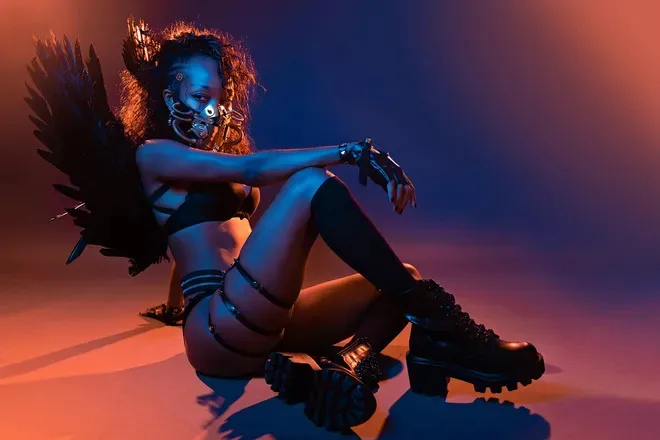
King Cyborg: Using Shadow Work in Music
Music Interviews
![“My songs can be very encrypted, but once you dive deeper into the streaming waves of it, you will hear and feel that every song I create contains a part of my struggles and traumas which, fortunately, has helped a lot of people dealing with similar traumas [that] I do,” King Cyborg says.](https://mloz35cl5wye.i.optimole.com/snBIwec-Ek128iLy/w:267/h:400/q:90/process:129412/id:cdefa54bad00132ecf8d969920dec1f5/https://www.slugmag.com/meta_eyJzcmNCdWNrZXQiOiJiemdsZmlsZXMifQ-1.jpg)
King Cyborg was born to be an artist—from singing to dancing and fashion, Cyborg is dripping with talent. “Music played an enormous role [in my early life] … It was like I was constantly walking through life, and life has a soundtrack full of moody, romantic, glitch-ridden music embedded with my bold personality,” says Cyborg. Growing up on the Iiha de Luanda Island of Angola, South Africa, Cyborg learned many styles of dancing and singing at a very young age, from traditional African styles to western styles of blues and jazz. This extensive knowledge only confirmed her love for music. Her sound consists of a menagerie of genres, from avant-pop to experimental R&B, neo-soul and dream pop. This confluence of cultures is interpreted through dark melodies and tranquility, sending listeners on a multi-dimensional, cybernetic trip.
“I want to inspire people [to be their authentic selves] to embrace their sexuality and their quirkiness.”
Cyborg delivers a healing atmosphere in her music, playing off of the concept of “shadow work” and the comfort it can bring to her listeners. “Shadow work is a practice of self-acceptance, healing and self-growth. It’s the process of coming face to face with your pain instead of suppressing everything that you don’t want to think, feel or address. You go into this process with an attitude of compassion for yourself and your experiences,” says Cyborg. To her, a deeper connection exists between the artist and their listeners—it goes beyond stunning vocals and banging beats. “My songs can be very encrypted, but once you dive deeper into the streaming waves of it, you will hear and feel that every song I create contains a part of my struggles and traumas which, fortunately, has helped a lot of people dealing with similar traumas [that] I do,” she says.
Cyborg has been listening to a multitude of genres since birth, and it’s hard to pinpoint one, specific sonic impact. She describes her influences as an avalanche of cultures. “I don’t have a specific reference point for inspiration or influences,” she says. “For instance, I … listen to rock, metal, porch blues and jazz. Those are just a few of the musical and cultural waters I drank from at a very young age. Being Angolan, I also listened to Semba, Kizomba, Kuduro and Fado.” With these diverse guidances, Cyborg gives her songs a more inclusive meaning, especially in “Under the Moon,” where the cheery, rhythmic Semba beats pair perfectly with the polished harmony of Cyborg’s voice and electro-pop guitar, ultimately creating a musical blend of African roots and American pop music.

Cyborg’s creative process begins within the first 10 seconds of listening to a beat or instrument. After those 10 seconds, she begins to assemble both a melody and story. Cyborg is not only creating the sound of her songs, but she is also creating the emotional takeaway for her listeners. From there, she starts building the rest of the song. “It’s in the way the instruments hit my chakras and in the way it makes me feel. Every song I create has a melody and visuals attached to it,” she says. Not only does Cyborg create music and visual accompaniments, but she also tends to leave lessons in her music, hoping that others understand and appreciate the shared trauma between humans. “I want to inspire people [to be their authentic selves] to embrace their sexuality and their quirkiness,” Cyborg says.
“Shadow work is a practice of self-acceptance, healing and self-growth. It’s the process of coming face to face with your pain instead of suppressing everything that you don’t want to think, feel or address. … “
The resulting product gives Cyborg reason to continue her path by teaching herself music production. ”It’s so magical and truly satisfying; it’s freedom. It’s one of the main reasons why I’m self-teaching music production so that I can put all these sounds into this reality,” she says.
Recently, King Cyborg performed at The L Project’s Pride showcase in Los Angeles. She adds, “I’m currently working on a few song projects that are soon to be released, both individually and with other amazing artists. It’s exciting—I’m excited!” The best way to keep up with Cyborg is through her mailing list (available at KingCyborg.com) and by following her on social media under @kngcybrg.
Read more interviews with musicians:
The Complexity of Care, Community and Comfort in Sharmi Basu’s Music
MJ Noble on Finding Her Sound In Her New Album, Kind Blade